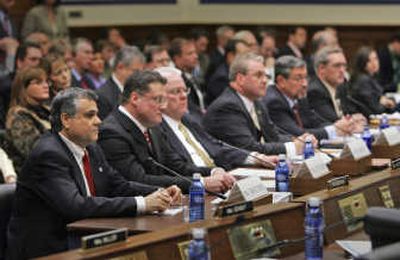FAA inspectors say agency hampered oversight protests

WASHINGTON – Federal aviation safety inspectors told members of Congress Thursday that they repeatedly ran into roadblocks when trying to report oversight lapses that allowed Southwest Airlines last year to operate passenger flights with planes in need of key safety checks.
Those problems demonstrate weakness in the Federal Aviation Administration’s efforts to ensure safety at all airlines, the inspector general for the Transportation Department told lawmakers. Since it was disclosed last month that Southwest kept flying dozens of planes in need of inspections for fuselage cracks, four carriers have grounded more than 500 planes and canceled hundreds of flights to conduct inspections or make required repairs.
The FAA’s reliance on airlines to voluntarily disclose safety issues “promotes a pattern of excessive leniency at the expense of effective oversight and appropriate enforcement,” Inspector General Calvin Scovel told the House Transportation Committee on Thursday.
Several FAA inspectors described their struggles in trying to get their superiors and other inspectors to take tougher stances with Southwest. Instead of taking prompt regulatory action, their bosses tried to find ways to help Southwest avoid sanctions, they testified.
When they attempted to report those issues to officials higher up the FAA chain of command, they were harassed, threatened and even punished, they said.
They also said the FAA had gone from aggressively regulating airlines to treating them like customers or clients. Lawmakers and outside safety experts have expressed similar worries about regulators’ coziness with the carriers.
One inspector, Douglas Peters, said his experience proved that there “was evidence that FAA management personnel with the responsibility and the authority to take appropriate action proved themselves unworthy of being custodians of the public trust.”
Rep. James Oberstar, D-Minn., chairman of the committee, said issues raised by the inspectors represented the “most egregious lapse of safety I have seen in the last 23 years.”
“The FAA would have us believe that what took place was an isolated incident,” Oberstar said. “But … this was a systematic breakdown of the safety oversight role of the FAA.”
FAA officials have said the problems with Southwest appeared to be unique, and a recent audit revealed that airlines were complying with 99 percent of safety directions. Four unidentified carriers are under investigation for not complying with directives, the FAA has said.
The groundings and inspection errors are coming to light during the safest period in the history of U.S. commercial aviation. There has been only one major fatal commercial jet crash in the United States since late 2001. Even the sharpest critics of the FAA’s oversight, including Oberstar, have said that air travelers should not be afraid to get on passenger planes.
The FAA’s top safety officer, Nicholas Sabatini, apologized to lawmakers Thursday for his agency’s mishandling of the Southwest inspection debacle. He promised that investigators were trying to get to the bottom of what occurred. “I consider what happened to be egregious,” Sabatini said, adding that the whistle-blowing inspectors were heroes.
Scovel, the inspector general, told lawmakers that the FAA relied too heavily on airlines to report problems under a program that encourages voluntary disclosure of safety dangers. In exchange for reporting such issues and quickly fixing them, airlines often avoid punishment. Scovel said that the Southwest lapses were “symptomatic of much deeper problems with FAA oversight.”
Last month – a year after the original problems at Southwest – the FAA fined the carrier $10.2 million for the missed safety checks and for continuing to fly the planes even after the airline learned that it had missed the inspections.
Southwest Chairman Herb Kelleher and chief executive Gary Kelly both testified that safety was never compromised by the missed inspections.